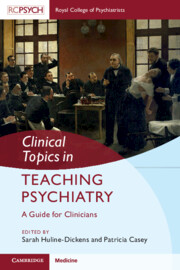Book contents
- Clinical Topics in Teaching Psychiatry
- Clinical Topics in Teaching Psychiatry
- Copyright page
- Dedication
- Contents
- Contributors
- A Note on the Cover
- Introduction
- Section 1 Teaching and Preparation
- Section 2 Teaching Methods
- Chapter 6 Small- and Large-Group Teaching
- Chapter 7 Whys and Hows of Patient-Based Teaching
- Chapter 8 Simulation-Based Learning in Psychiatric Training
- Chapter 9 Running Journal Clubs in Psychiatry
- Chapter 10 Workshops: An Important Element in Medical Education
- Chapter 11 Delivering a Good Lecture
- Section 3 Feedback, Assessment and Supervision
- Section 4 Bridging the Gaps: Foundation Years and Interprofessional Education
- Section 5 Technologies Old and New
- Section 6 Supporting the Trainee in Difficulty
- Index
- References
Chapter 9 - Running Journal Clubs in Psychiatry
from Section 2 - Teaching Methods
Published online by Cambridge University Press: 24 November 2022
- Clinical Topics in Teaching Psychiatry
- Clinical Topics in Teaching Psychiatry
- Copyright page
- Dedication
- Contents
- Contributors
- A Note on the Cover
- Introduction
- Section 1 Teaching and Preparation
- Section 2 Teaching Methods
- Chapter 6 Small- and Large-Group Teaching
- Chapter 7 Whys and Hows of Patient-Based Teaching
- Chapter 8 Simulation-Based Learning in Psychiatric Training
- Chapter 9 Running Journal Clubs in Psychiatry
- Chapter 10 Workshops: An Important Element in Medical Education
- Chapter 11 Delivering a Good Lecture
- Section 3 Feedback, Assessment and Supervision
- Section 4 Bridging the Gaps: Foundation Years and Interprofessional Education
- Section 5 Technologies Old and New
- Section 6 Supporting the Trainee in Difficulty
- Index
- References
Summary
‘Job plans must include dedicated time for academic and educational activities such as attending journal clubs’, declare the eligibility criteria for the Member of the Royal College of Psychiatrists (MRCPsych) examinations (Royal College of Psychiatrists 2021, p. 12). Journal clubs also meet the requirements for continuing professional development (CPD) for UK consultant and staff grade and associate specialist (SAS) psychiatrists as defined in College guidelines (Royal College of Psychiatrists 2015). Since the critical review paper was introduced into the MRCPsych examinations in 1999, journal clubs have been seen as one of the main opportunities to teach these skills in psychiatry, and the curriculum for core training in psychiatry requires trainees to present a journal club annually. However, Glasziou’s complaint that ‘Many journal clubs are boring because the articles are quickly trashed as poor research and nothing changes’ (Glasziou 2007) is not uncommon. Can journal clubs promote understanding and practice of evidence-based medicine (EBM) principles?
- Type
- Chapter
- Information
- Clinical Topics in Teaching PsychiatryA Guide for Clinicians, pp. 103 - 114Publisher: Cambridge University PressPrint publication year: 2022

